Feature
Nutrition for Growth
Multisectoral Efforts (Health / Food and Agriculture / Education)
Sharing the Importance of Eating Habits
Eating a healthy diet every day is vital for better nutrition. In Madagascar, efforts are being made to reduce stunting in children and increase school attendance.
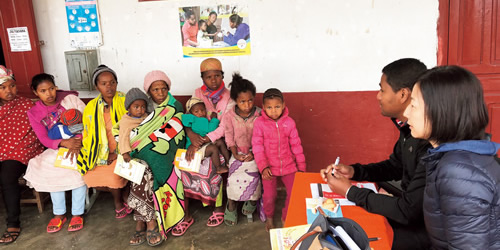
In preparation for an awareness campaign, JICA asks mothers about their diets, their knowledge of nutrition, and how they look after their children.

Republic of Madagascar
Creating Synergy for Better Nutrition
Malnutrition is an urgent problem in Madagascar, where 49.2 percent of children under 5 years old suffer from stunting-the fifth highest rate in the world. To tackle this problem, in March 2019, JICA commenced a project in the island's central highlands, where about 80 percent of the population is engaged in agriculture. The project aims to help farmers to find ways to increase their incomes, to give them advice to spend extra income on foods with a high nutritional value, and to promote kitchen gardens so that people can help themselves to have a more balanced diet. As the first stage of the project, surveys are being conducted to quantify and analyze farmers' incomes, nutrient intake, and the spread of kitchen gardens.
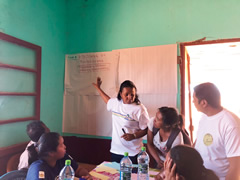
A discussion takes place with community representatives on how to change behaviors
One unique aspect of this project is the large number of cooperating institutions. In addition to Madagascar's National Office of Nutrition, Ministry of Agriculture, and Ministry of Public Health, the project is collaborating with the World Bank, which is providing loans to improve nutrition. In the same regions where the World Bank supports volunteers to educate mothers on improving children's diets and sanitation, JICA is working to increase farmers' incomes, promote gardening, and raise awareness about the importance of eating nutritious foods. "The aim is to harmoniously combine different approaches to achieve a synergistic effect," said Inada Yuji of the Rural Development Department.
Preparing School Meals Together
In Madagascar, as part of the "School for All" project, which aims to improve children's education environments, JICA is contributing to better nutrition through school meals. The meals are being provided at the initiative of students' parents and community members with the cooperation of schools and the government. Without school meals, children could lose concentration in classes due to hunger or go home for lunch and not return. Given this context, providing school meals is a good way to ensure children get nutritious food as well as learning opportunities.
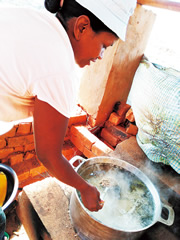
Ingredients for school meals are provided by local farmers or purchased with donations.
JICA supports the project by creating a framework in which schools, the government, and local residents can cooperate. Firstly, each village establishes a catering committee organized by representatives and selected by villagers, then the committees discuss what contributions will be necessary to provide the meals. With the cooperation of schools and the government, the committees procure ingredients, prepare cooking facilities and utensils, gather firewood, and hire cooks. At the committee debriefing sessions, which are held several times a year, committee members explain in detail the importance of school meals to locals, and secure ongoing support in the form of donations, rice, and other foodstuffs.
The school meal initiative, which began in 2017, is currently being implemented at 59 schools throughout the country. On average, it supplies about 30 days' worth of meals every year.
At the Sixth Tokyo International Conference on African Development (TICAD VI) in 2016, JICA led the launch of the Initiative for Food and Nutrition Security in Africa (IFNA) [1] which continues to be implemented with the cooperation of various governments and organizations. Inada said, "Efforts are proceeding to construct systems to improve nutrition that apply in many different fields in Madagascar and other countries. We would like to further improve nutrition by being involved in projects that produce results, such as School for All."
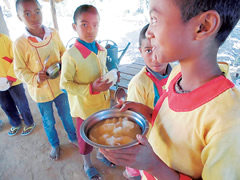
Today's lunch is cassava (a kind of tuber) soup. "I'm glad that there's lunch," students say. School meals can help to increase school attendance.
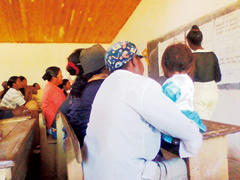
A catering committee reports to the community in a debriefing session.
Note
- [1]IFNA aims to strengthen ties between African governments and support organizations, set goals to improve nutrition, and work to achieve them.




scroll